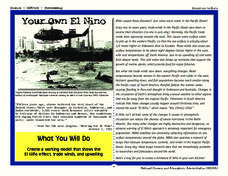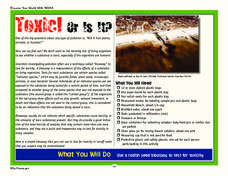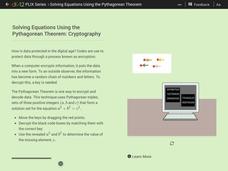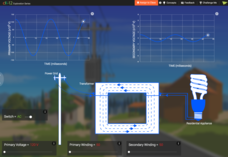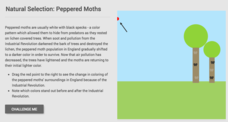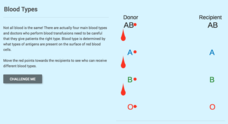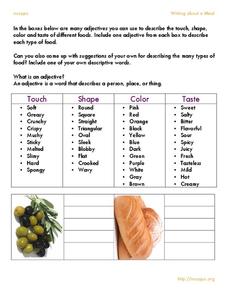NOAA
Make Your Own Compass
Scholars build a compass using a needle, cork, magnet, and a water-filled cup in order to locate the magnetic north and south.
CK-12 Foundation
Bow and Arrow
Where does the energy of an arrow come from? Is it from the person, the bow, or somewhere else? A simulation allows scholars to adjust the stretch distance and the elastic constant in order to understand where the energy comes from, what...
NOAA
Your Own El Nino
Scholars make a model to discover how the force of trade winds over the Pacific Ocean creates an El Niño. Super scientists observe how the severe weather affects life in water and on land.
NOAA
Toxic! Or Is It?
Super scientists tests the toxicity of water using radish seed bioassays. Over the course of five days, scholars observe the germination process of several radish seeds, looking closely at their roots to determine the level of toxins...
CK-12 Foundation
Sprinter
Why do sprinters wear spiked shoes? Scholars explore various styles of shoes and how they handle forces when running. Scholars adjust variables including shoe type, horizontal force, surface type, and normal force to determine which...
CK-12 Foundation
Scuba Training
How does a scuba diver control whether they sink or float? Scholars observe the relationship between absolute pressure and depth below the surface in an undersea simulation. They control the diver size and depth to center of mass to see...
CK-12 Foundation
Contact Lens
How do contact lenses work? The simulation allows young scientists to explore focal length and lens type to see how and why contact lenses work. Pupils control the focal length for an eye and a lens, the type of lens, and the distance...
CK-12 Foundation
Diamond Cut
How do jewelers tell the difference between diamonds, glass, and cubic zirconia? A sparkling simulation demonstrates how to use a ray of light to determine the substance and ideal shape for a diamond. Scholars control the material,...
CK-12 Foundation
Solving Equations Using the Pythagorean Theorem: Cryptography
Don't keep this resource a secret. Individuals learn to use the Pythagorean Theorem to find Pythagorean triples. They also see how Pythagorean triples can be useful in the field of cryptography to encrypt secret messages.
CK-12 Foundation
AC Transformer
High voltage power lines deliver electricity to homes, but each home requires low voltage. How does the energy get converted so it can be used safely? Pupils explore alternating current and transformers through a simulation. They control...
CK-12 Foundation
Modern Genetics
Genetic counselors advise their clients on the chance of passing specific diseases on to their children. Pupils learn about genotypes, phenotypes, and genetics in the lesson. Matching activities, multiple-choice questions, and a...
CK-12 Foundation
Natural Selection: Peppered Moths
Can human activity influence the colors of moths? The simulation explains how pollution changed the color of tree bark, which led to the survival of a different variation of moths. It also discusses the shift back as air quality improves.
CK-12 Foundation
Blood Types
Does your blood type matter? The video explains the four main blood types and the importance of knowing blood types when performing transfusions. The interactive reviews the information with a quick graphic organizer and questions.
Discovery Education
STEM Camp—Urban Infrastructure
Build a bridge to learning in a STEM-aligned unit about urban infrastructure. Young engineers explore the many aspects of civil planning and design in a five-day unit. Content includes the challenging aspects of balancing building with...
NOAA
Hurricanes
Here's a hurricane lesson that's sure to catch your eye! Pupils learn about the unique balance of conditions required to form one of nature's most destructive forces. The interactive illustrates how hurricanes form, grow, and affect...
Roald Dahl
Matilda - The Weekly Test
Readers take the main characters in Matilda and individually describe them through a mnemonic. To get there, group members create an acrostic poem describing the character they were given, and choose one of the words from the acrostic...
Big Learning
The Antarctica Project: A Middle School Mathematics Unit
Antarctica is a big place, large enough to provide ample opportunities to learn about math. A two-week unit teaches middle school mathematics concepts using project-based learning. The resource covers functions, geometry (area,...
Maker Media
Makerspace Playbook
Make the most of project-based learning with Makerspace. A playbook shows instructors and other interested parties how to set up a Makerspace and Maker community to foster STEM projects. It gives ideas for startup activities and for...
Nosapo
Writing about a Meal
You don't need to be a food critic to describe your meal accurately! A series of activities introduce learners to vivid adjectives when writing about the taste, smell, and feel of food. After working with word choice, parts of a...
NOAA
Invent a Robot!
Wait til your class gets their hands on this! Aspiring engineers design a working robotic arm in the fifth and final installment in a series of ocean exploration lessons. Pupils learn about the use of underwater robots in ocean...
NPR
Introduction to the Engineering Design Process
Step by step is always best. In groups, future engineers create the tallest possible tower with marshmallows and spaghetti sticks. Along the way, they learn about the engineering design process.
NPR
Prototype the Solution
It's always nice to see what the solution looks like. Groups build a prototype of their solution to the plastics problem in the sixth installment of a 10-part unit. The prototypes can be either a visual prototype or a working prototype.
Emergency & Community Health Outreach
Breast Cancer: Prevent, Detect, Treat
Odds are, most of the members of your class know someone who has been affected by breast cancer. Teach them more about prevention through healthy lifestyles, detection with self-testing and mammograms, and the most effective treatments...
PBS
Stories of Painkiller Addiction: Decisions and Consequences
Teach young learners that most drug addictions end in one of three outcomes: treatment, jail, or death. After watching a short video segment on the consequences of drug abuse, class members discuss what they viewed and consider what...
Other popular searches
- Boston Tea Party Invitation
- Letter Writing Invitation
- Writing Invitations
- Writing an Invitation
- Birthday Invitations
- Invitation Writing
- Creating an Invitation
- Esl Writing Invitation
- Making Invitations
- Party Invitations
- Teacher Letter of Invitation
- Spanish Invitations




